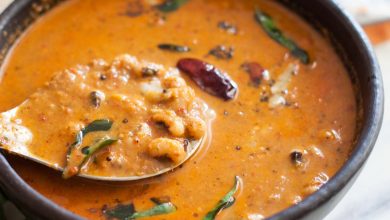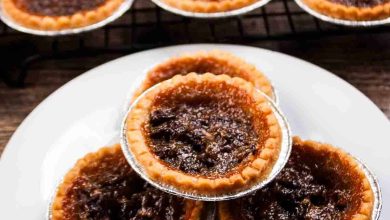Japanese Cotton Cheesecake Recipe
Introduction
Japanese Cotton Cheesecake, with its ultra-light and airy texture, is a delightful fusion dessert that brings together the creaminess of traditional cheesecake with a cloud-like fluffiness reminiscent of a sponge cake. This unique recipe blends the rich flavors of cream cheese with the delicate fragrances of saffron and cardamom, creating a dessert that is both decadent and refreshing. Perfect for any occasion, this cheesecake pairs wonderfully with a cup of tea or coffee, and it also makes an excellent treat after a hearty meal. Follow the simple steps to create this melt-in-your-mouth dessert that is bound to impress your guests!
Ingredients
| Ingredient | Quantity |
|---|---|
| Milk | 1-1/2 cups |
| Cardamom Powder (Elaichi) | 1/2 teaspoon |
| Saffron strands | 1/2 teaspoon |
| Sugar | 2 tablespoons |
| Rabdi (thickened milk) | 1/2 cup |
| Whole Eggs (at room temperature) | 3 |
| Britannia Cream Cheese | 125 grams |
| Butter | 2 tablespoons |
| All Purpose Flour (Maida) | 1/4 cup |
| Corn Flour | 1-1/2 tablespoons |
| Granulated Sugar | 1/4 cup |
Equipment Needed
- 9 x 4 inch loaf pan
- Parchment paper
- Double boiler setup (saucepan and heatproof bowl)
- Hand whisk or electric mixer
- Spatula
- Wire rack
Prep Time: 30 minutes
Cook Time: 40 minutes
Total Time: 70 minutes
Servings: 2
Cuisine: Asian
Course: Dessert
Diet: Vegetarian
Instructions
1. Prepare the Oven and Pan
Begin by preheating your oven to 140°C (280°F). Next, line a 9 x 4 inch loaf pan with parchment paper. Ensure that the parchment paper overlaps the sides, making it easy to lift the cheesecake out once it’s baked.
2. Make the Rabdi (Thickened Milk)
In a wide, thick-bottomed pan, heat the milk along with the sugar, cardamom powder, and saffron strands. Bring the mixture to a boil. Once it starts boiling, reduce the heat to medium-low. Continue heating the milk, scraping off the cream that forms on the surface at regular intervals. Use a spatula to gather the cream and stick it to the sides of the pan. The goal is to reduce the milk to about 1/2 cup (a third of the original volume). Once the milk is thickened and reduced, remove the pan from the heat.
Transfer the rabdi (thickened milk) to a bowl and set it aside.
3. Melt the Cream Cheese and Butter
Add the cream cheese and butter to the bowl containing the rabdi. Set the bowl on top of a saucepan filled with about an inch of water, creating a double boiler setup. Place the saucepan on medium heat, and whisk the mixture until the cream cheese and butter have fully melted and combined. Allow this mixture to cool slightly.
4. Prepare the Egg Yolk Mixture
Once the rabdi-cream cheese mixture has cooled, whisk in the egg yolks until smooth. Sift in the all-purpose flour and corn flour, and whisk again until the batter is lump-free and silky smooth.
5. Whip the Egg Whites
In a separate bowl, beat the egg whites with an electric mixer or a hand whisk until they become foamy. Gradually add the granulated sugar in portions, continuing to beat until stiff, shiny peaks form. To check for stiffness, turn the bowl upside down—if the egg whites do not move, they are ready.
6. Fold in the Egg Whites
Carefully fold the whipped egg whites into the egg yolk-cream cheese-rabdi mixture. Do this gently in three or four additions, ensuring that you do not over-beat. The goal is to retain the light and airy texture of the egg whites.
7. Prepare for Baking
Pour the combined batter into the prepared loaf pan. Place the loaf pan in a larger pan, and fill the outer pan with hot water until it reaches halfway up the sides of the loaf pan. This water bath (bain-marie) will help the cheesecake bake evenly, preventing it from cracking.
8. Bake the Cheesecake
Place the pan in the preheated oven and bake at 140°C (280°F) for 40-45 minutes. The cheesecake is done when the top is golden brown and the cake has set. You can test doneness by gently tapping the top—if it springs back, it’s ready.
9. Cool the Cheesecake
Once baked, remove the cheesecake from the oven. Let it cool completely on a wire rack. Once cooled, carefully remove it from the pan using the parchment paper.
10. Serve and Enjoy
Slice the cheesecake and serve it as a delicious dessert after lunch or dinner. This Japanese Cotton Cheesecake pairs beautifully with a light beverage, such as Japanese green tea, and complements a savory meal like Japanese Chicken Udon Soup or Chicken Yakisoba.
Tips for the Perfect Japanese Cotton Cheesecake
- Egg Temperature: Ensure your eggs are at room temperature before use. Cold eggs can cause the batter to separate.
- Cream Cheese: If you can’t find Britannia cream cheese, any high-quality cream cheese will work. Just make sure it’s softened for easier mixing.
- Whip the Egg Whites Properly: Properly whipped egg whites are crucial for the light texture of the cheesecake. Be patient and ensure they form stiff peaks before folding them into the batter.
- Avoid Overmixing: When folding the egg whites into the batter, use a light hand to preserve the airy texture. Over-mixing can cause the cheesecake to lose its fluffiness.
- Water Bath: Don’t skip the water bath, as it prevents the cheesecake from drying out and cracking during baking.
Nutritional Information (Per Serving)
| Nutrient | Amount per Serving |
|---|---|
| Calories | ~320 |
| Protein | ~7g |
| Carbohydrates | ~35g |
| Sugars | ~17g |
| Fat | ~18g |
| Saturated Fat | ~11g |
| Cholesterol | ~135mg |
| Sodium | ~190mg |
| Fiber | ~1g |
Conclusion
Japanese Cotton Cheesecake is a unique dessert that combines the best of both worlds—rich and creamy like a traditional cheesecake but light and fluffy like a sponge cake. This fusion recipe is sure to become a favorite in your household, offering a delicate yet indulgent treat that can be enjoyed by family and friends. With its subtle flavors of saffron and cardamom and its melt-in-the-mouth texture, this cheesecake is the perfect way to end any meal on a sweet note.




